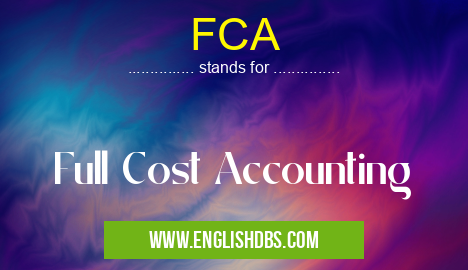What does FCA mean in ACCOUNTING
FCA (Full Cost Accounting) is a method of accounting that assigns all costs of production to a product or service, including both direct and indirect costs. This differs from variable costing, which only assigns variable costs to a product or service.

FCA meaning in Accounting in Business
FCA mostly used in an acronym Accounting in Category Business that means Full Cost Accounting
Shorthand: FCA,
Full Form: Full Cost Accounting
For more information of "Full Cost Accounting", see the section below.
» Business » Accounting
Direct costs are those that can be directly attributed to the production of a product or service, such as raw materials, labor, and freight. Indirect costs are those that cannot be directly attributed to a product or service, such as rent, utilities, and administrative salaries.
How FCA Works
In FCA, all costs are allocated to a product or service based on a predetermined allocation method. This method is typically based on the percentage of direct costs that a product or service consumes. For example, if a product consumes 50% of the total direct costs, then it will also be allocated 50% of the indirect costs.
Benefits of FCA
FCA provides several benefits over variable costing, including:
- Improved accuracy: FCA assigns all costs to a product or service, which results in a more accurate representation of its profitability.
- Better decision-making: FCA can help managers make better decisions by providing them with a more complete picture of the costs associated with a product or service.
- Increased transparency: FCA promotes transparency by providing a detailed breakdown of all costs.
Drawbacks of FCA
However, FCA also has some drawbacks, including:
- Complexity: FCA can be more complex and time-consuming to implement than variable costing.
- Subjectivity: The allocation of indirect costs is subjective, which can lead to inaccurate results.
- Difficulty in comparing products or services: FCA can make it difficult to compare the profitability of different products or services, as the allocation of indirect costs can vary.
Essential Questions and Answers on Full Cost Accounting in "BUSINESS»ACCOUNTING"
What is Full Cost Accounting (FCA)?
Full Cost Accounting is a method of accounting that assigns all relevant costs to a product, process, or service. This includes direct costs, such as raw materials and labor, as well as indirect costs, such as overhead and administrative expenses.
What are the benefits of using FCA?
FCA provides a more accurate picture of the total cost of a product or service, which can help businesses make better decisions about pricing, production, and marketing. It can also help businesses identify areas where costs can be reduced.
What are the limitations of FCA?
FCA can be more complex and time-consuming than other accounting methods, and it can be difficult to determine which indirect costs should be included in the full cost of a product or service.
How is FCA different from Marginal Cost Accounting (MCA)?
FCA assigns all relevant costs to a product or service, while MCA only assigns variable costs. This means that FCA provides a more comprehensive view of the total cost of a product or service.
What are some examples of industries that use FCA?
FCA is used in a variety of industries, including manufacturing, construction, and healthcare.
Final Words: FCA is a method of accounting that can provide several benefits over variable costing. However, it is important to be aware of its drawbacks before implementing it.
FCA also stands for: |
|
| All stands for FCA |
